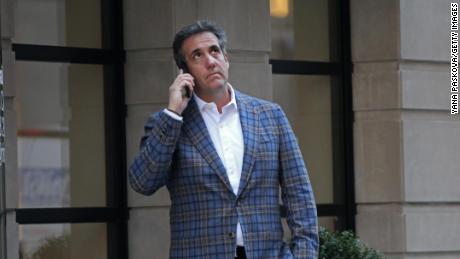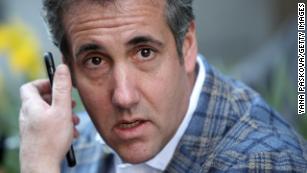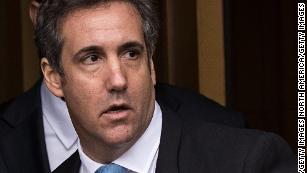begin quote from: What Cohen's booming business revealed
There's a very simple reason why companies paid Michael Cohen so much money
(CNN)This paragraph from new CNN reporting on Michael Cohen, a longtime ally of President Donald Trump, is both startling and revealing:"[Cohen] aggressively pitched himself to potential clients, reminding them of his proximity to the most powerful man in the world. Those efforts landed Cohen lucrative consulting deals. New reporting this week revealed that in the months following the 2016 election, Cohen received hundreds of thousands of dollars from powerful entities based in and outside of the United States."What's startling is the sums companies were willing to pay Cohen for his "insights" into the president-elect. Pharmaceutical giant Novartis doled out a whopping $1.2 million to Cohen. AT&T, which is in the midst of an attempt to buy CNN's parent company Time Warner, paid Cohen at least $200,000.The revealing -- and more important -- insight that comes out of Cohen's business boom is this: No one thought Donald Trump was going to win.Let me explain.Normally, in the course of a presidential campaign the corporate world makes sure that it has some ties to each of the candidates. They have someone in their shop who is also a longtime friend or trusted adviser to the candidate. That doesn't mean that these big companies are in constant contact with the campaign or even have face-to-face conversations with the candidate or his (or her) inner circle.Think of it more of an insurance policy. The president -- any president -- has a profound impact on the corporate world. The corporate world, therefore, likes to know it has entree to the president's inner circle if they absolutely need it.In most presidential campaigns -- and with most presidential candidates -- this is a seamless process. The vast majority have spent time in elected office. They have interacted regularly with the influence culture of lobbyists and the like. Someone in large-sized company always knows someone in a big presidential campaign.The Trump campaign was not like most campaigns. Sure, Trump was a businessman. But, his business was selling himself. And the people who worked for him were, largely, just that: People who did stuff Trump told them to do. His inner circle was very, very small and almost entirely composed of family members and a handful of slavishly devoted underlings like Cohen and Dan Scavino.That insularity made the number of people who could give you insight (ahem) into Trump very, very limited. But, even then, the inner circle could have been worked for connections by corporate America.Why wasn't it? Because -- you guessed it -- no one thought Trump would win. Remember that he began the campaign as something in between a punchline and as asterisk. Even as he began to pick up steam in the Republican primary, there was an overwhelming belief -- particularly in corporate America -- that he would never ultimately be the nominee. That disbelief continued into the general election -- fueled by polls and punditry that suggested that the question was not whether Trump would lose but rather whether he would lose in a historically large way.Fast forward to 10 p.m. (or so) on November 8, 2016 -- aka the moment it became clear that Trump not only might win but that he was likely to win. Cue panic for corporations who realized in that moment -- and the days that followed -- that they had zero knowledge of this president's views on subjects near and dear to their business and, even worse, they didn't have an obvious entry point to make sure he heard what they wanted/needed him to hear.Which brings us to Cohen, who, say what you will about him, sensed a business opportunity. His sales pitch, according to one GOP strategist familiar with it, was devastating in its transactional simplicity:"I don't know who's been representing you, but you should fire them all. I'm the guy you should hire. I'm closest to the President. I'm his personal lawyer."In short: You don't know Trump. You need to. I can make that happen.And, people paid. Because a) they had the money and b) they wanted the insight -- which is better read as access.Now, of course, they are apologizing. "We made a mistake in entering into this agreement," said the Novartis CEO Vasant Narasimhan on Thursday.They did make a mistake, but it's not the one Narasimhan is apologizing for. The mistake was not taking Trump seriously, not believing he could win. Everything after that was trying to fix that original mistake. And Michael Cohen was simply an outgrowth of that desire to just fix it.
To the best of my ability I write about my experience of the Universe Past, Present and Future
Top 10 Posts This Month
- Here's how much ACA premiums would have risen this year without tax subsidies:
- As storms inundated Washington state, federal grants for flood mitigation work sat on hold
- Trump to make announcement with Hegseth on shipbuilding from Mar-a-Lago
- What are the real Truths of Life?
- Deputy AG says removing photos from Epstein files has 'nothing to do' with Trump(Sure thing) (ha ha)
- gold has surged 70% since the Start of the Year
- Judge orders plan to return ex-CECOT detainees to U.S. or give them hearings 3H ago
- Remembering the treasured films of Rob Reiner
- My enlightenment path actually become thousands of times more powerful and useful to me and everyone else when:
- How the global food system is impacting obesity and climate change: Study
Thursday, May 10, 2018
What Cohen's booming business revealed
begin quote from: What Cohen's booming business revealed
-
There's a very simple reason why companies paid Michael Cohen so much money
Subscribe to:
Post Comments (Atom)






















No comments:
Post a Comment